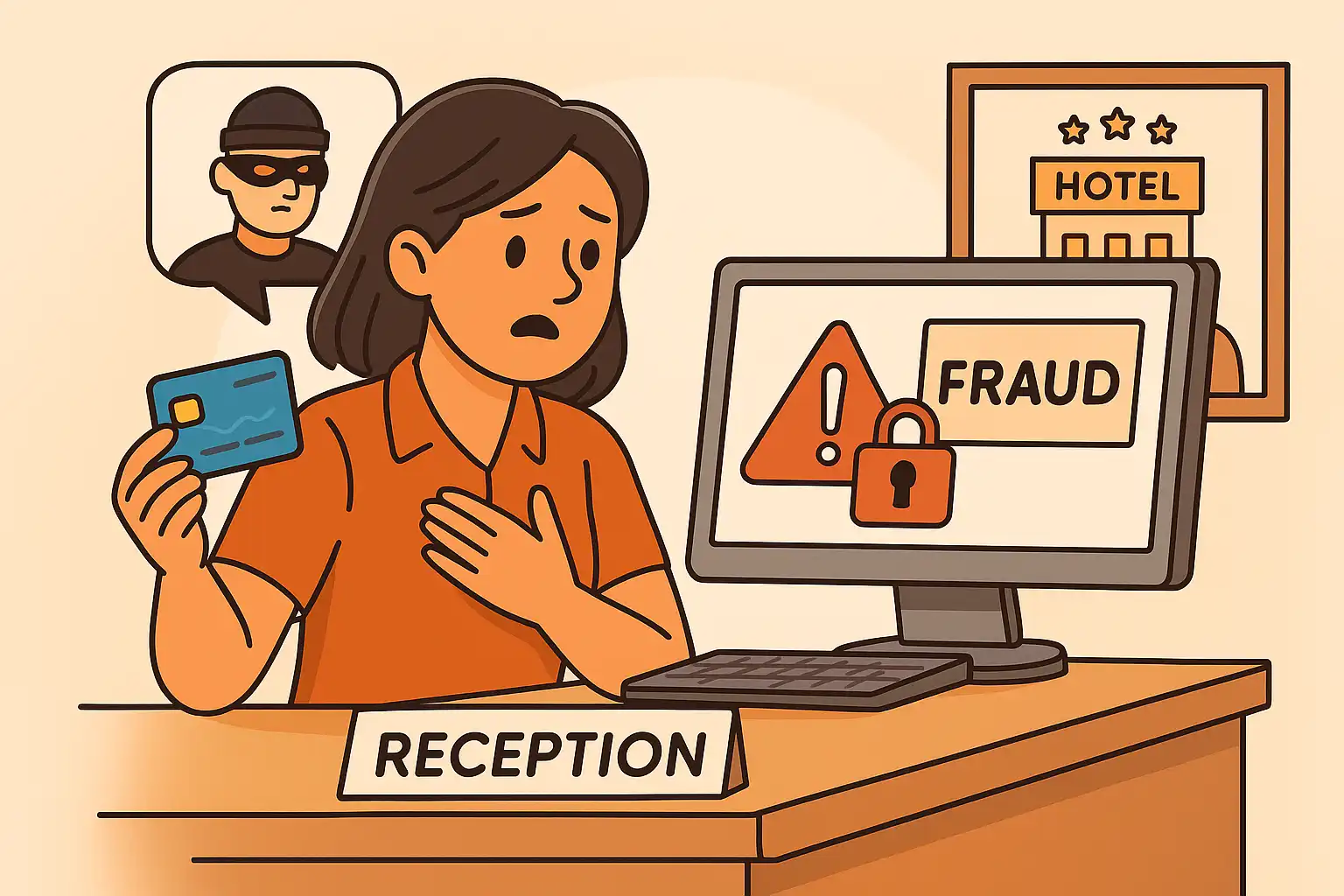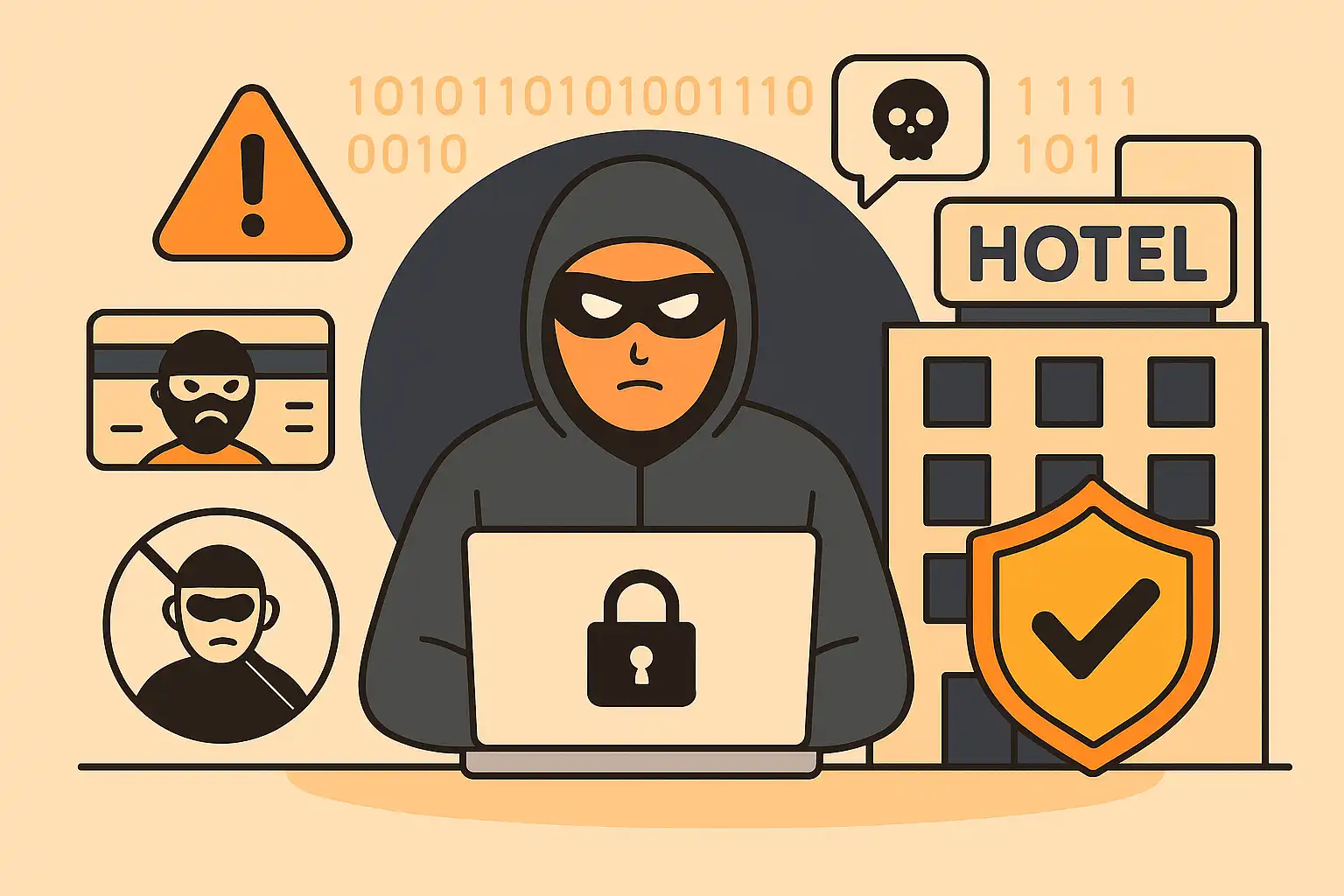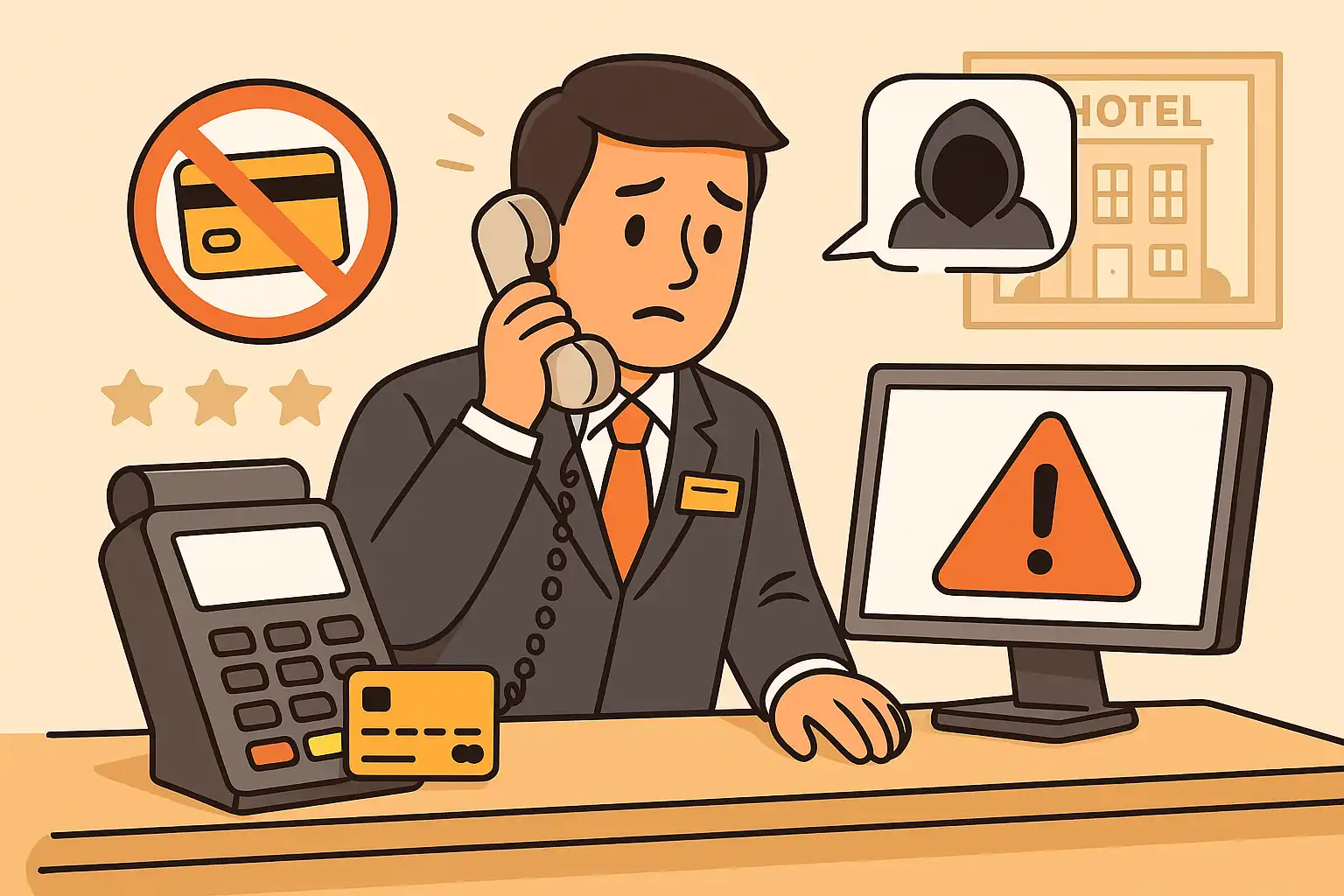Hotel Fraud: How Hoteliers Can Protect Revenue & Operations
 Mika Takahashi
Mika Takahashi Mika Takahashi
Mika TakahashiHotel fraud is one of the toughest challenges we face in the hospitality industry today. As more hotels depend on digital payment systems, online bookings, and automated tools, fraudsters have found new ways to exploit vulnerabilities, steal money, and access sensitive guest data.
The numbers are sobering. Certified fraud examiners estimate that fraud costs the hospitality sector 5-6% of its annual revenue. For a hotel bringing in $10 million a year, that’s a potential loss of $300,000 to $600,000 annually. And that’s just the average — some properties lose even more when targeted by organized fraud rings.
Why are hotels such easy targets for hotel frauds? It’s a mix of factors: lots of transactions every day, multiple payment channels, valuable customer data, and a culture that often puts guest experience ahead of strict security checks. This environment creates openings for fraudsters both outside and inside your organization.
In this guide, we’ll walk through what hotel fraud looks like, how it impacts your business, and practical steps to detect, prevent, and respond to it. From credit card fraud and chargeback scams to employee theft and vendor collusion, we’ll cover what you need to know to protect your revenue, operations, and reputation — without sacrificing the guest experience.

Hotel fraud includes any deceptive practice aimed at stealing money, services, or sensitive guest data from your property. Unlike some industries where fraud might focus on a single angle, hotels face a complicated mix of threats. These can hit payment systems, customer information, loyalty programs, and internal processes all at once.
The hospitality model itself creates vulnerabilities that fraudsters know how to exploit. Quick guest turnover means there’s limited time to verify identities properly. Multiple revenue streams — rooms, dining, events, spa treatments — open many doors for fraudulent transactions. Plus, the personal and financial data collected during stays makes hotels prime targets for identity theft.
Here’s a real-world example: A front desk team once noticed a guest who booked multiple high-value rooms under different names but paid with the same credit card. The reservations were flagged, and further checks revealed stolen credit card details being tested. Catching this early saved the hotel thousands in potential losses.
A systematic literature review found that fraud against hotels has jumped 300% in the last decade, largely due to digital transformation outpacing security upgrades. The Association of Certified Fraud Examiners notes that hospitality businesses face fraud rates 40% higher than the cross-industry average.
Fraud comes from outside your hotel — guests, criminals, cyber attackers — and inside, from employees abusing their access. External fraud often targets payment and reservation systems, while internal fraud might involve cash theft, inventory pilfering, or selling guest information.
Because modern hotel systems are interconnected — property management, payment gateways, booking platforms, loyalty databases — a breach in one area can quickly spread, causing cascading losses.
This is why fraud prevention can’t be a one-off effort. It requires ongoing vigilance and adaptation as fraudsters get smarter and new technologies emerge.
Hotel frauds impact goes far beyond lost revenue. It creates a ripple effect of direct and hidden costs that hit your bottom line and operational efficiency.
Direct losses come from things like chargebacks, where guests dispute legitimate charges. Each chargeback can cost you around $190, plus the time your team spends investigating. When disputes arise, you lose the original revenue and pay processing fees — and your payment processor might hike your rates if chargebacks pile up.
Credit card fraud using stolen details adds complexity. Beyond losing revenue, you might face fines for PCI compliance breaches and spend months on forensic investigations. Globally, data breaches cost hotels an average of $3.4 million, with recovery taking half a year or more.
Employee theft is another big drain. Internal audits show occupational fraud in hotels averages $140,000 per incident. Some cases involve years of systematic theft, costing hundreds of thousands. Plus, there’s the cost of investigations, legal fees, and hiring replacements.
Operationally, fraud investigations pull your team away from guest service. Front desk staff spend hours documenting suspicious activity, managers conduct cash audits, and IT handles security breaches — all distracting from daily operations and revenue generation.
Reputation damage is often overlooked but can be devastating. Data breaches or negative reviews about security concerns can scare off future guests. Recovering trust requires costly marketing and guest engagement efforts.
Insurance premiums often rise after fraud incidents, sometimes doubling or tripling. Hotels hit repeatedly may struggle to get coverage at all.
To fight fraud, you need to know what you’re up against. Hotels face a wide range of scams from outside criminals and inside employees, each exploiting different weaknesses.
Technology has shifted the fraud landscape. While cash theft and invoice scams still happen, digital fraud now dominates losses.
External fraud accounts for about 70% of total fraud losses. The biggest culprits? Credit card fraud, chargeback scams, and identity theft. Internal fraud, though less frequent, often involves bigger losses due to employees’ access and time.
Credit card fraud tops the list. Fraudsters use stolen card details to make bookings and purchases, sometimes running “card testing” scams where they validate batches of stolen cards through hotels before moving on to bigger crimes.
Chargeback fraud — or friendly fraud — is when guests dispute legitimate charges after their stay. This has jumped 340% since 2015. Guests might claim unauthorized charges or service issues to get refunds, forcing hotels to prove the charges were valid under tight deadlines.
Reservation fraud involves fake bookings using stolen identities or fake accounts. These no-shows tie up rooms and mess with revenue management. Some fraudsters book multiple rooms to manipulate pricing or availability.
Identity theft targets loyalty accounts and guest data. Criminals use stolen credentials to redeem points or book services. Account takeovers have surged 280% due to weak passwords and poor authentication.
Corporate fraud involves third-party vendors inflating invoices or billing for fake services. Vendor collusion with employees can drain money unnoticed for months.
Fake review attacks aim to damage your reputation rather than steal money, but the impact on bookings and trust is real.
Employee theft comes in many forms: cash skimming at the front desk, pilfering minibar stock, or giving unauthorized freebies. Staff have access to cash and inventory, creating many theft opportunities.
Kickbacks happen when employees accept bribes from suppliers for contract favors or inflated pricing. Purchasing and maintenance teams are often involved.
Dishonest staff might over-pour drinks, provide free services, or manipulate billing systems to pocket cash while appearing to serve guests well.
Some employees misuse system access to steal guest data for resale or scams. As data’s value rises, this threat grows.
Time theft and payroll fraud include buddy punching, fake overtime, and scheduling abuse to boost pay unfairly.
Vendor collusion involves employees helping outsiders with fake invoices or inflated contracts, often over long periods.
Pro tip: Regular surprise audits and inventory checks can catch employee theft early, saving thousands before losses grow.

Detecting hotel fraud early requires smart technology that analyzes transaction data in real time to spot suspicious patterns. Hotels using advanced detection cut fraud losses by 60-80% and improve operational efficiency by automating alerts.
AI-powered analytics are key. These systems look at booking patterns, payment behavior, and guest interactions to find anomalies humans might miss. Machine learning adapts as fraud tactics evolve, refining detection based on past incidents.
Real-time alerts flag high-risk reservations: mismatched billing info, last-minute bookings for premium rooms, or payments from risky regions. This lets staff verify suspicious bookings before confirming.
Integrating fraud detection with your property management system means monitoring happens seamlessly without disrupting operations. Risk scores can evaluate each reservation by payment method, guest history, and booking habits.
Staff should watch for red flags like guests refusing ID, payments from cards that don’t match the guest, multiple bookings from one payment source, and same-day arrivals for high-value rooms.
Machine learning improves over time by learning from false alarms and confirmed fraud, reducing unnecessary investigations.
Automated alerts for transactions over set risk levels ensure management can act fast on suspicious activity.
Unusual booking patterns to investigate include multiple reservations under different names with the same card, early bookings followed by immediate changes, or spending far outside a guest’s usual behavior.
Combining data from social media, device info, and behavior creates detailed risk profiles, improving detection accuracy and cutting false positives.
Stopping hotel fraud before it happens means layering technology, processes, and training to build strong defenses. Hotels with robust prevention see 70% fewer fraud cases and lower financial losses.
Prevention beats reaction every time. Detecting fraud limits damage, but stopping it upfront saves money and protects your operations.
Use PCI Level-1 compliant digital authorization systems to secure payments. These encrypt credit card data, reducing breach risks. Digital forms replace paper ones that can be stolen or copied.
Tokenization swaps card numbers for useless tokens, so stolen data is worthless. Encryption protects data in transit and storage.
Add Address Verification Service (AVS) and 3D Secure authentication to payment steps. AVS checks billing addresses; 3D Secure requires cardholder authentication before payment. These cut credit card fraud significantly.
Keep your Wi-Fi networks secure and separate guest from admin traffic. Use WPA3 encryption, change passwords regularly, and restrict access.
Schedule quarterly security audits and penetration tests to find and fix vulnerabilities before criminals do.
Require multi-factor authentication for all admin access to prevent breaches from stolen passwords.
Train new employees on hotel fraud basics during onboarding. Cover credit card fraud signs, suspicious guest behavior, and verification steps.
Hold monthly refresher workshops on new fraud trends to keep knowledge fresh.
Create anonymous reporting channels so staff can safely flag suspicious activity.
Use role-playing exercises so front desk and managers can practice handling fraud scenarios confidently while keeping service friendly.
Provide clear, written verification procedures for guest ID and payments, plus escalation steps for suspicious cases.
Require ID verification with photo capture at check-in to prevent fake bookings and identity theft. Keep photos secure to protect privacy and support disputes.
Preauthorize credit cards 24-48 hours before arrival to catch payment issues early.
Manually review high-value and group bookings to confirm legitimacy and reduce risk.
Enforce hotel refund policies that return money only to the original payment method to avoid laundering and fraud.
Conduct surprise cash counts and inventory audits to catch employee theft and process gaps.
Vet all vendors thoroughly with background checks and contract reviews to prevent vendor fraud.
Even with the best defenses, fraud can happen. Having a clear response plan helps limit damage and recover losses.
Act fast to contain the issue: freeze affected accounts, disable compromised systems, and secure evidence before it’s lost.
Set up a response team ready to act within 30 minutes of detection.
Freeze guest accounts, loyalty access, and payment methods to stop ongoing fraud.
Collect detailed documentation immediately — transaction records, guest communications, service confirmations, and verification docs. This is crucial for chargeback disputes.
Remember, you have 60-75 days to submit evidence for disputes — no extensions.
Notify all relevant parties quickly: guests, law enforcement, payment processors, and regulators. Data breaches usually require notification within 72 hours.
After the incident, review what went wrong and update procedures to prevent repeats.
Recovery options include insurance claims, legal action, and working with law enforcement on asset recovery.
Communicate transparently with affected guests, balancing openness with protecting investigation details.
Have backup systems and alternative payment methods ready to keep operations running smoothly.

Fraud prevention works best when integrated into daily hotel operations and regularly updated to meet new threats.
Make fraud prevention part of your standard procedures — from check-in to payment processing to guest services.
Regularly assess your property’s fraud risks to focus your security investments where they’ll do the most good.
Balance technology costs against potential losses and efficiency gains. Advanced fraud detection often pays for itself.
Collaborate with industry peers and law enforcement to share threat intelligence and best practices.
Keep your security measures fresh with regular updates, audits, and staff training.
Treat fraud prevention as an investment in protecting your revenue, not just an expense.
Manage vendor relationships carefully with clear contracts and performance metrics.
Track key performance indicators like fraud loss rates, false positives, resolution times, and staff confidence in handling fraud.
Test your incident response with drills and real-case reviews to improve readiness.
Analyze fraud data and prevention results to spot trends and keep improving.
Stay compliant with PCI, data protection laws, and local regulations to avoid penalties.
Fraud is an evolving threat that demands a proactive, layered defense tailored to your hotel’s unique risks. Hotels that combine technology, staff training, and strong controls typically cut fraud losses by 70-80% while keeping guests happy.
Ignoring fraud protection can cost you more than money — it can disrupt operations, damage your reputation, and shrink your future revenue. With fraud eating up 5-6% of hospitality revenue annually, investing in prevention is a smart business move.
Fraud prevention isn’t a one-and-done task. It’s an ongoing priority that should be woven into every part of your hotel’s operations.
Start by assessing your current risks and plugging the biggest holes. The cost of prevention is always less than the cost of recovery.
Myth vs Reality
Myth: Fraud prevention slows down guest check-in and hurts the guest experience.
Reality: When integrated smoothly, verification processes and digital tools can speed up check-in while protecting your property. Guests appreciate secure, trustworthy service.
Hotel fraud is complex and costly, but you don’t have to face it alone. By understanding the risks and implementing layered defenses — secure payment systems, staff training, operational controls, and advanced fraud detection — you protect your revenue and reputation.
Remember:
By making fraud prevention part of your daily operations, you safeguard your hotel’s financial health and guest trust — the foundation of long-term success.
Ready to take control? Start your fraud risk assessment today and build a stronger defense for your property.